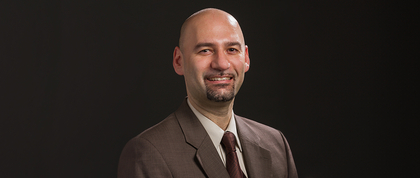
Dr. Hamada Hamid Altalib (MPH '08) is the Chief of Neurology at the Veteran Affairs (VA) Connecticut Healthcare System. He helped establish a VA neurobehavioral clinic, which provides clinical care for veterans who suffer from emotional distress and/or behavioral problems associated with neurological conditions. At Yale University he also provides care for people with neurological injury that impact emotional processing.
What was your favorite experience at NYU?
As a resident and graduate student my time at NYU was very stressful, but when cohorts of people work or train under a lot stress they grow close. We went through something together, and I enjoyed connecting to classmates and co-residents during break times, meals and study circles. The connection to people, including mentors and faculty, is what I enjoyed most about my NYU experience.
How do you leverage your public health degree in the work you're doing?
My public health degree has a profound impact on my perspective and approach to my work. The MPH provided a theoretical framework as well as methodological skills to work on program evaluations, health systems reform, access to and delivery of care, and measuring processes and outcomes. My public health degree taught me a language that I use daily to communicate with biostatisticians, policy makers and other public health researchers.
What do you love most about your job?
I love the variety of experiences my job offers me. I teach and mentor fellows and junior faculty, I engage in strategic planning for our health care service, review health care utilization data to inform program development, provide direct patient care, and I’m actively engaged in neuropsychiatry and health service research.
What is a career accomplishment that you are proud of?
I am most proud of my mentees who have moved on and are doing well in their careers. I was very fortunate to have opportunities, including engaged mentors, throughout my professional journey. I am very sensitive to the reality that many talented and hardworking people do not.
What is one important trend or opportunity in your industry that should be talked about more?
This is where I’m supposed to say AI in population health, and that may be true. However, since Covid the public has received a crash course in the role of public health, including the role of epidemiology in informing social policy. Before developing or deploying AI in population health data, we need to be intentional about how and what purpose we use data for. There is a broad trend or shift from medical informatics (in which health-related data mainly resides in medical centers) to digital health in which real-time data are collected and stored in smartphone apps, wearable devices and in the “internet of things.” How we collect, manage and interpret those data in a responsible and safe way is rapidly evolving.
What advice would you give to a prospective student who is considering a public health career?
Go big! Look for jobs at large institutions or start-ups where there are opportunities for growth, development and promotion. Many health system directors and CEOs have MPH degrees. Certainly, major academics and thought leaders have PhDs in public health. Prospective students should be intentional about internship opportunities, capstone projects and summer opportunities that may inform their career decisions.